Moms for democracy
On the road with the rural Wisconsin women building a better country, one door at a time
Emily Tseffos knows how to do this.
She knows how to transform a Toyota Sienna into a makeshift campaign headquarters– a trunk full of yard signs, plastic containers with neat piles of glossy flyers competing for space with car seats. She knows that when you’re canvassing farmhouses you should park halfway down the driveway and walk the remainder of the way to the front door. She knows that when a husband says “oh I’m definitely for Trump, no question about it” to watch his wife’s face. Chances are, she’s not as enthusiastic.
Most of all, though, she knows how to start a conversation.
“Hi, I’m Emily Tseffos. I’m running for Assembly here in the 56th District. I’m at the very bottom of your ballot, so it’s the kind of race that if I don’t come meet you face to face, you may never hear about. That’s why I’m out here doing everybody’s favorite thing… talking politics with strangers.”
That last line’s a little joke, but the truth is, strangers really do enjoy talking politics with Emily Tseffos. It’s no surprise why. She’s direct, vulnerable and curious. She doesn’t hide who she is or what she believes– within the first minute at a stranger’s door, she shares not only that she’s a Democrat but that she’s a survivor of sexual violence and a mom of boys, one of whom has a rare health condition and another of whom receives special education services. And then, when those strangers open up to her, she lets the conversation breathe. She listens with interest and asks thoughtful follow up questions regardless of whether they announce themselves as strong MAGA supporters, committed Democrats or skeptical independents.
“So why do you think it’s been hard to keep employees lately?”
“You don’t trust that social security will be around four years from now when you retire?”
“You mentioned that you’re voting with your daughters in mind. What do you mean by that?”
The conversations aren’t easy. This election cycle is Wisconsin’s first after its previous legislative maps– long considered the most gerrymandered in the nation– were declared unconstitutional by the state Supreme Court. The old maps, hand drawn by GOP legislators in 2010, provided a built-in structural advantage to Republicans. This year, the playing field is more competitive and the Democratic Party of Wisconsin is cautiously optimistic about its chances to put a dent in that red wall.
But even with new maps, the 56th Assembly District– a sprawling patchwork of small towns, suburbs and farmland west of Appleton– is conservative country. Tseffos has had plenty of contentious debates at strangers’ doors– about trans rights, D.E.I. and especially abortion. The hardest moments are when her own story as a survivor is dismissed or ignored, when she hopes to connect person-to-person and is instead met with cruelty. It’s one thing to bemoan polarization or misinformation from the comfort of your living room. It’s another thing altogether to wake up every weekday for a year, drop off your kids at school, and pull into yet another driveway festooned with Trump signs and introduce yourself as a Democratic woman who’d like a few minutes of their time.
There aren’t many people who fully understand what Emily Tseffos’ life has looked like this past year– the weird mishmash of joy, heartbreak and Groundhog Day-level exhaustion that is part and parcel of running as a Democratic woman in rural Wisconsin. Halfway across the state, though, Sarah Keyseki gets it.
A therapist, mom and community activist in tiny Lodi, Keyseki was drafted by Wisconsin Democrats to flip the 14th State Senate District– a territory that stretches west and north out of Madison’s exburbs into the rolling hills, terraced farms and dramatic bluffs of Wisconsin’s Dells and Driftless regions. Keyeski isn’t the kind of person who always dreamed of running for elected office. She’s more of a hand raiser than a spotlight chaser. A few years ago, as her town was torn apart by the pandemic and its political aftershocks, she founded Lift Lodi, a community-wide volunteer day that has now become a beloved annual tradition. Even if you didn’t know she was a therapist, you’d guess it after an hour watching her talk at doors, where her interactions are marked by empathetic eye contact and questions that are more likely to focus on how voters are doing than their thoughts on Trump and Harris. She’s gotten more than one taciturn dairy farmer to open up about his mental health struggles with their prospective State Senator, no small feat in this land of patriarchal Lutheran reserve.
Unlike Tseffos’ district, Keyeski’s has been classified as a key pickup opportunity by the state party. This means more money and party support, but also more pressure. That distinction means little on a day to day basis, though. Every morning, both women wake up with essentially the same agenda– long hours, longer drives and an endless series of doors where they try to make the case not only for themselves but a very different vision of politics than voters are used to in 2024.
Communities like the ones that Keyeski and Tseffos travel to every day hold a paradoxical place in the current American political landscape. They’re not forgotten, particularly if one’s gauge of forgottenness is the number of times they’ve been profiled by national news outlets. In the eight years since Trump’s election in 2016, it’s difficult to find a rural, majority White town in Michigan, Wisconsin or Pennsylvania that hasn’t hosted reporters from the New York Times or the Washington Post. If you want to make a multiracial group of urban progressives roll their eyes, just mention all the ink our nation’s papers of record have devoted to truly hearing the perspectives of older White voters in the Fox Valley and the Driftless.
While our nation’s collective compassion fatigue towards rural White communities is understandable, the fact remains: rural communities may be superficially pandered to, but that doesn’t translate to them being better represented– either at the state or the federal level. One of the most striking similarities between Keyeski and Tseffos’ races is that both women are running against multi-term incumbents who, thanks to the power of incumbency and gerrymandering, have never actually had to work for their constituents’ vote.
Keyeski’s opponent this cycle is a reserved Grandma with decent regional name recognition because of her family’s John Deere dealership. Tseffos’ is a local businessman and Lion’s Club member, a guy who has been able to glide to victory primarily due to his existing networks and the R next to his name on ballots. Together, they served in a Republican controlled state legislature that has been infamous for how few days they’ve actually spent considering legislation. More than once, Wisconsin’s Democratic Governor has called for special sessions to address urgent statewide needs only to have Republican leaders immediately gavel out and send everybody home.
A few months ago, Tseffos was talking to a volunteer fire chief, a fairly conservative guy who was skeptical about voting for a Democratic woman. She asked the chief about her opponent by name. Unlike most of the questions she poses at doors, she suspected she knew the answer. “Do you know Dave? Actually, more importantly than that, does Dave know you? And what does it mean that you’re trying to run a fire department in this district and Dave, who has represented you for over a decade, doesn’t know you?”
That fire chief now has an Emily for Assembly sign on his front lawn.
There are scores of hardworking, community-minded candidates running across the state of Wisconsin, men and women alike, White, Black, Latino, Asian and Native. It is notable, though, that in these particular rural/exurban White communities– places that have been over-studied but under-represented politically– the individuals running a different type of political campaign are two moms. Just as there is a pernicious care gap within heterosexual marriages, so too has there long been a gendered gap between who volunteers for community care work: running PTA meetings, keeping churches alive, ensuring that fundraisers are successful. There is, of course, much to critique about that gap– in particular why men are more likely to grab the brass ring of high profile political careers but less likely to volunteer to organize events like Lift Lodi. But at a time of intense disconnection and isolation, where we get our news from online influencers but don’t know our neighbors, it’s not surprising that moms like Tseffos and Keyeski are the ones who are helping their communities write a new story.
Make no mistake about it, both women want to influence the immediate choice their constituents make at the ballot box. While they’re open to ticket splitting, every time they are at doors, they’re making a pitch for Democratic women up the ballot– Kamala Harris for President, Tammy Baldwin for U.S. Senate. They’re not just begging for votes, though. They’re asking their constituents to actually consider what would make their communities better and not just what national controversy du jour is animating social media. They’re saying, to everybody they meet at the door: you matter, I’m willing to listen to you, but I’m also going to ask you to consider the dignity of people you have never met.
I have no doubt that progressives– both in Wisconsin and nationwide– are rooting for campaigns like Tseffos’ and Keyeski’s, at least on a surface level. They are hoping, no doubt, that all those miles and all those doors knocked will lead to a Harris victory and a Democratic Senate. If the past is prologue, though, I fear that interest will wane the day after election day. And that’s a shame, because, neither woman is conceiving of this as a short-term project. Win or lose, they’ve met far too many of their neighbors to stop caring. If they win, they’ve committed to stay connected to the thousands of people they’ve met on the trail. They’ve made promises– both to their supporters and their opponents— that they’re going to keep listening. If they lose, they’re going to keep building on what they’ve helped spark this past year– potentially in future campaigns, definitely as community organizers.
Across the country, there has been a constant refrain, particularly in progressive circles, about how democracy is on the ballot. But what is democracy if it’s merely a four year cycle of nationalized outraged cycles and isolated communities. If we actually mean it, if we truly consider democracy to be on the ballot, then we need to do everything we can to support the candidates who are stitching together the frayed threads of our political fabric. We need to do everything we can to celebrate and support moms in minivans, driving down rural Wisconsin roads, reminding strangers to ignore the noise and the hatred, because we’re stronger together.
End notes:
I hope that, after reading today’s piece, you're inspired to get behind Emily and Sarah’s campaigns. Those links up above will take you to donation pages— both could still use contributions. If you’re within canvassing distance from either campaign, both are happy to put volunteers on get out the vote shifts as well. Otherwise, follow them on social media and get the word out. And if you’re wondering, “wait Garrett, have you written about these women before?” you’re half correct. I wrote about Sarah earlier this year, months before I met her, but this is my first piece about Emily.
Both Emily and Sarah were trained by Dirtroad Organizing, an inspiring crew of connectors, trainers and get-it-doners whom I love so much. They could always use support (as well as potential rural candidates, if you’re so inclined).
Speaking of cool people who train organizers (me), YOU ALL, TIME IS OF THE ESSENCE. There are only a few more Barnraisers Project fall classes remaining, so if you’ve been dawdling on registering, I highly suggest you jump on it. They’ve been so fun. .More details here, and registration here.
Most of you know this, but I wrote a book, The Right Kind of White, which is about a self-righteous son of the Heartland trying to run away from other White people and then trying the community thing. I’m the self-righteous White guy in question, but I don’t think my story is unique to me. If that sounds at all interesting, I think you’ll like it!
THIS THURSDAY! I will be talking about that book I wrote (and the broader task of building communities we all deserve) in WASHINGTON DC. on October 17th. Check this line-up out and RSVP here.
THIS SUNDAY, I’ll be speaking at the Friends Meeting of Washington (D.C.). It’s at the end of Meeting For Worship, which is a bit of a moving target, but noon is a safe bet.
It’s official. White Pages Thursday community discussions are the single best place on the internet, and not to toot my own horn but not that I’m sharing a top five list before opening the discussion, the whole affair has a whole new level of juice. Subscribe so that you can join us this Thursday!
Song of the week. I’m sorry! It’s on the nose! Was there any choice, though? Sing it, Lucinda.
The entire White Pages Songs of the Week playlist is available on bothApple Music and Spotify.




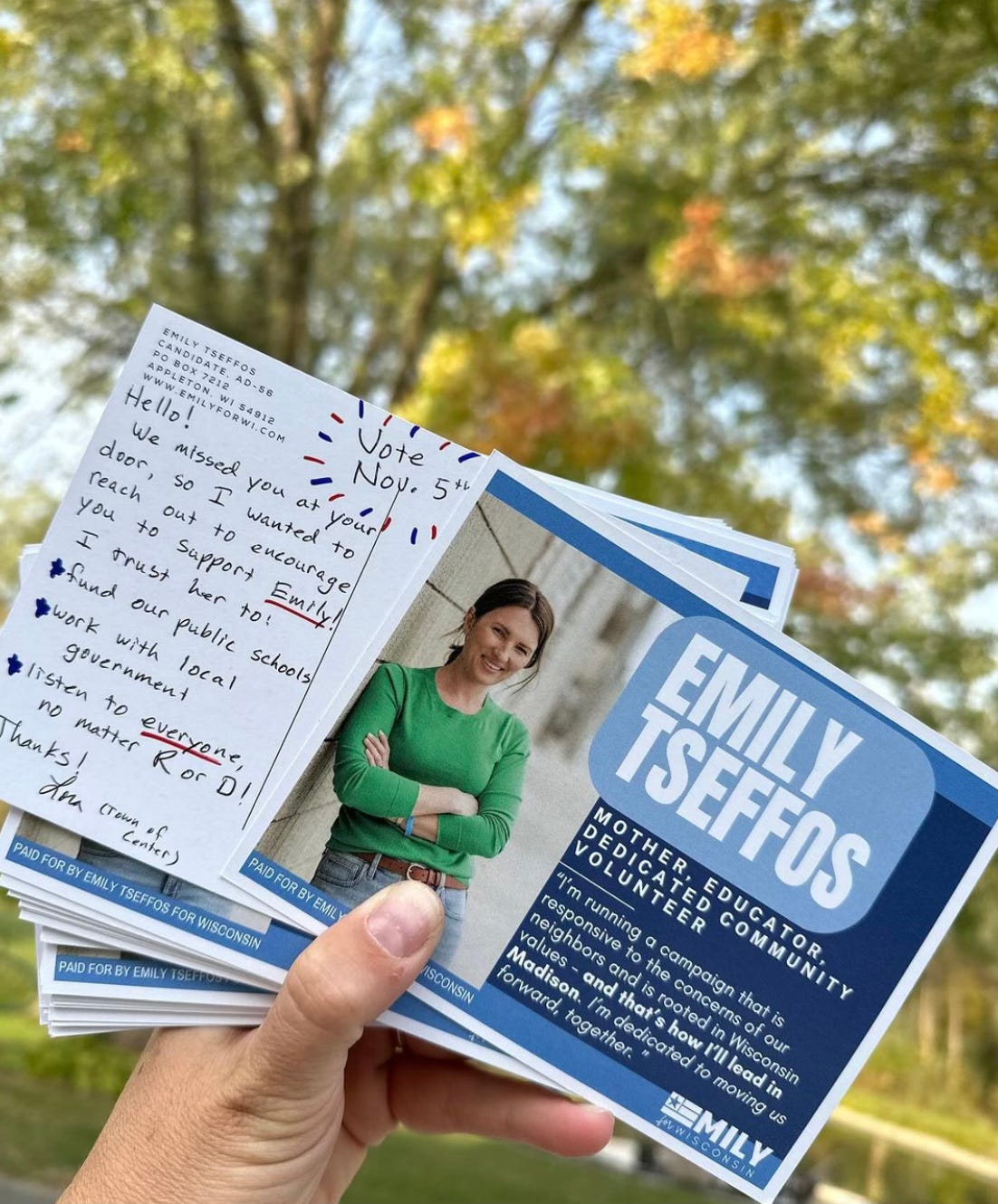
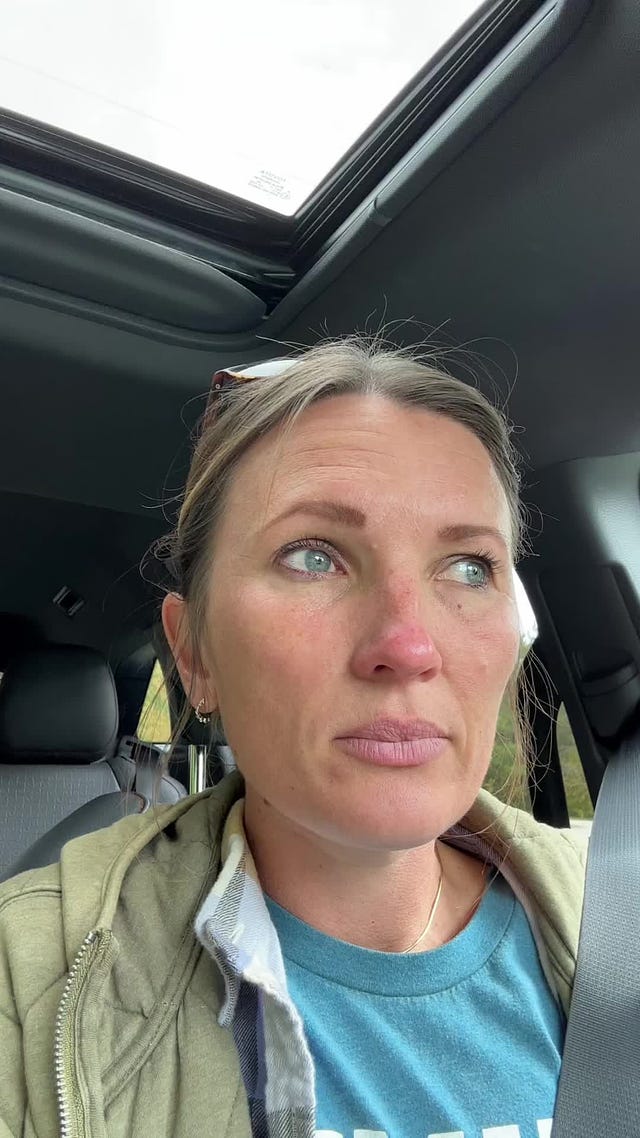

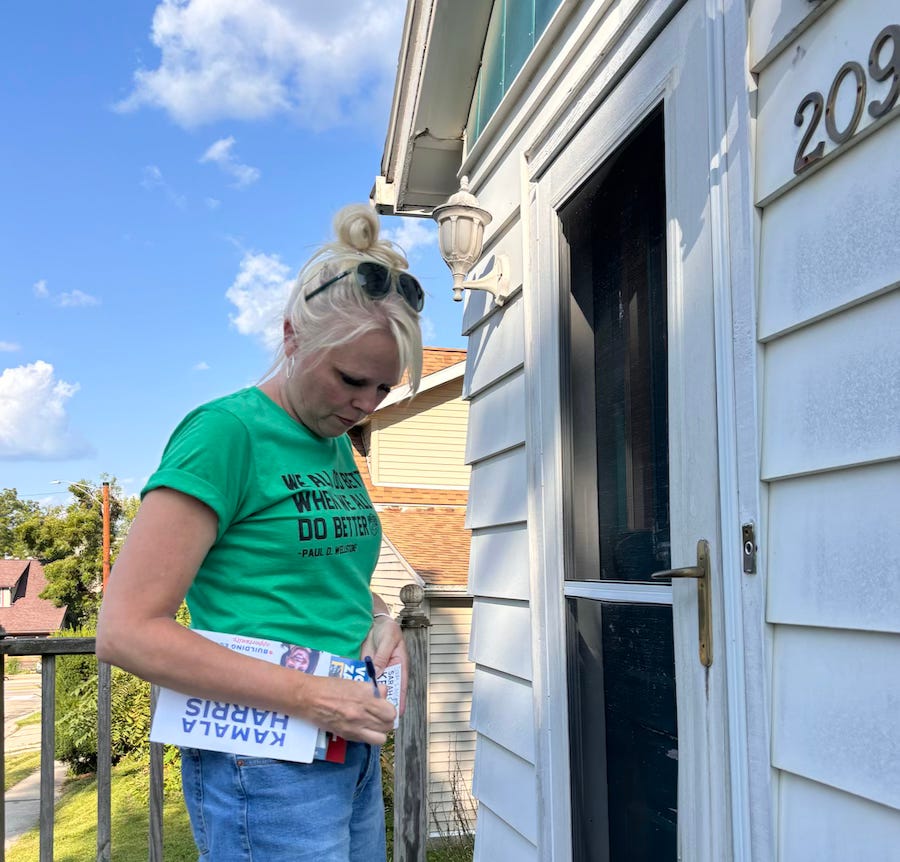
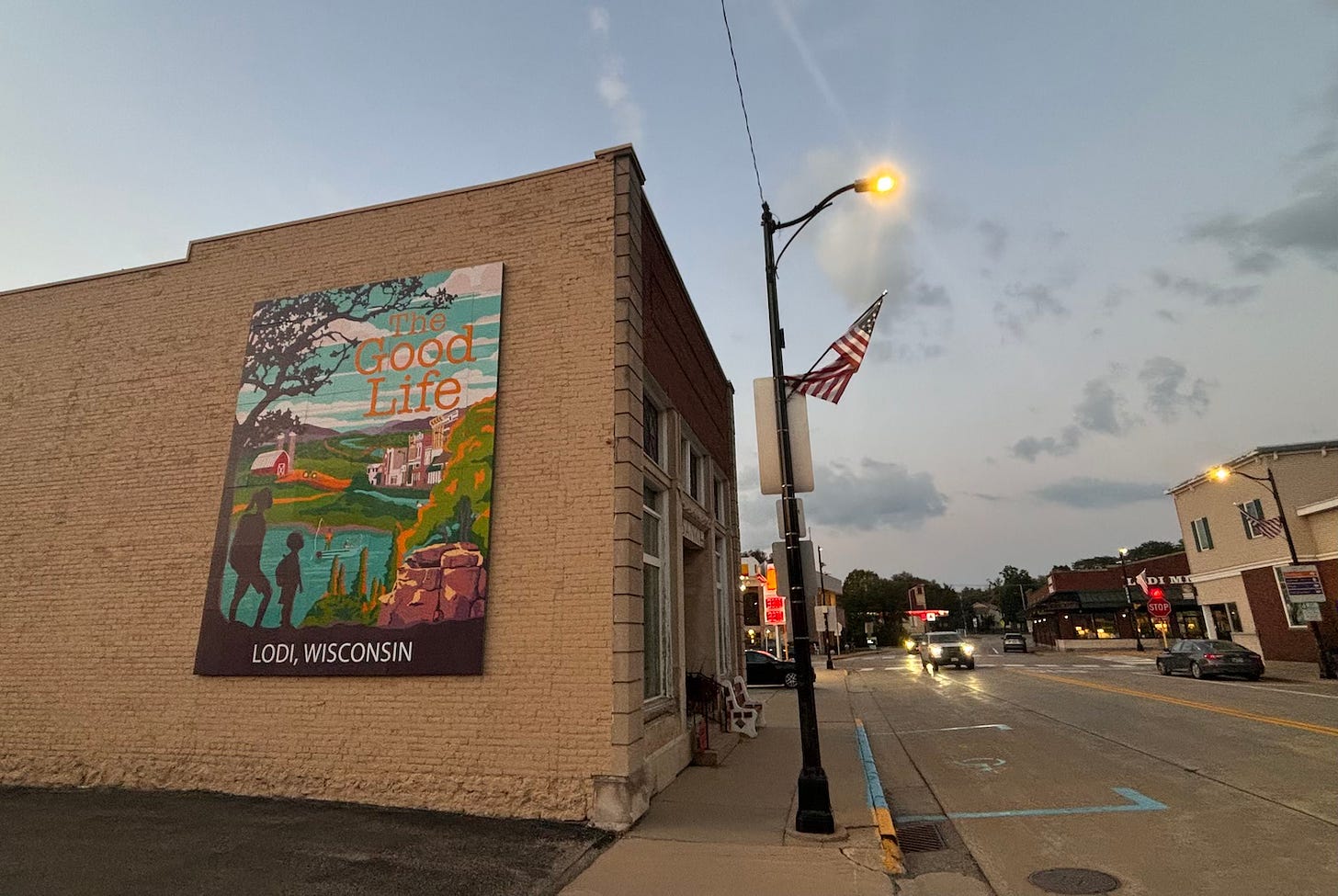
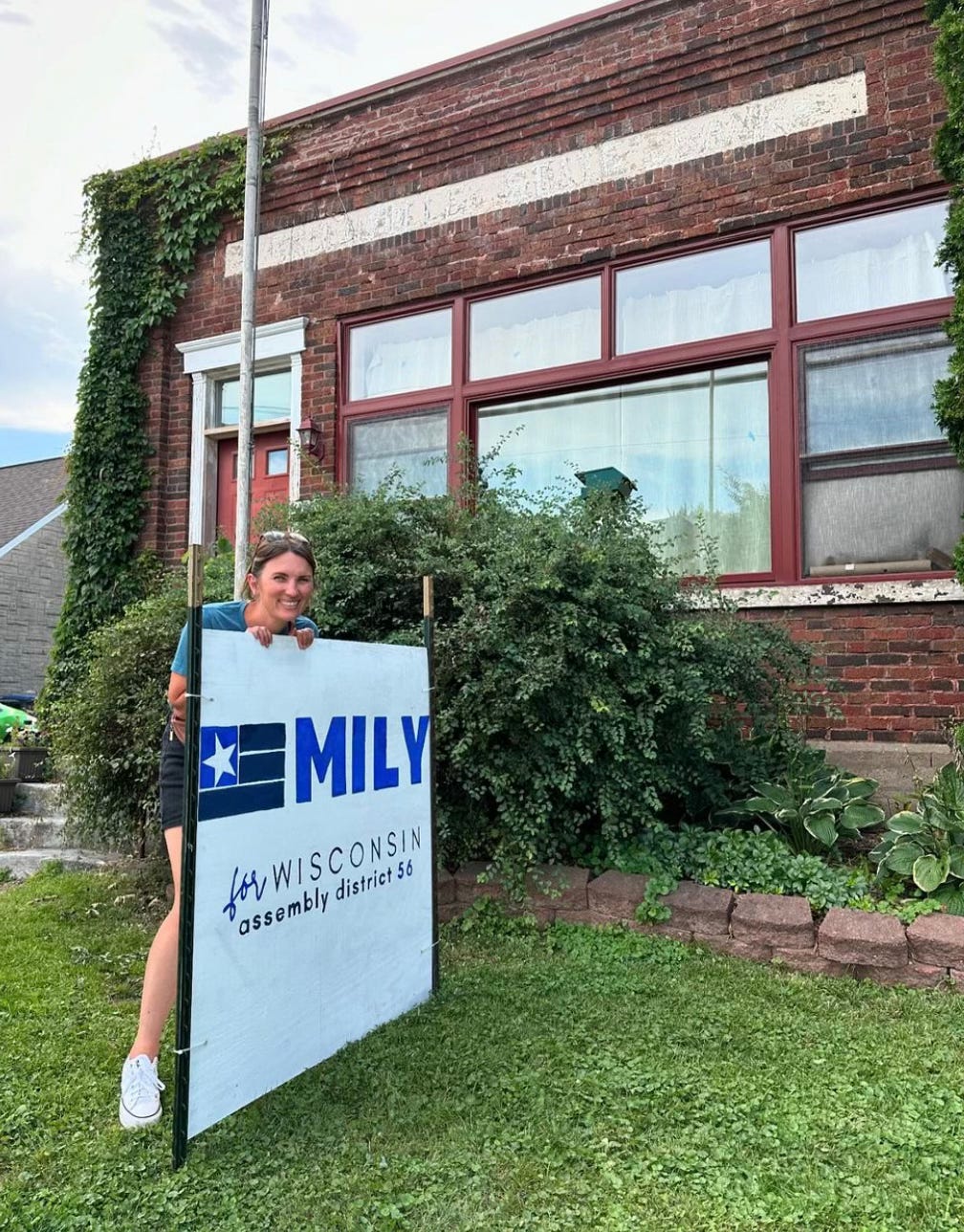


Gosh Garrett, I hope both women win, they seem like good people! I'd donate but I'm very poor, so poor I can barely afford your subscription lol, but it's
well worth it!
Very curious. Why park halfway up the farm driveway? So the inhabitants can see you walking and take your measure?
A privacy or safety issue? Cooties?
Thanks for featuring my future state assembly representative, Emily Tseffos! Her opponent Dave Murphy has only made himself available to constituents locally at Tea Party meetings held in the John Birch Society building. He refuses to return phone calls or respond to letters and consistently votes against his constituents best interests. Vote for Emily!